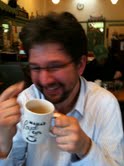 |
| King George VI in search of flow |
We all want continuity--what Mihaly Csikszentmihalyi calls “flow”--in whatever realms we care about most: our speech, writing, economy, relationships, sport, music, dance…the morning commute. It goes by many names (swing, pace, groove, the zone, grace) but it is singularly recognizable, beautiful, and satisfying.
All kinds of things keep us from achieving flow, but some of the most painful, and a theme of both The King’s Speech and this year’s other great holiday film, The Fighter, are the psychological impediments that inhibit continuity, even when, physically, it should be achievable. The protagonists in both movies are hobbled by psychological forces that have physical consequences. And both required radical treatments that addressed the psychological roots of their problems: in one case, a boxer’s inability to flow to victory, the key was detachment from his dysfunctional family; in the other, a king’s inability to deliver a pivotal speech, the key was the therapeutic honesty of a challenging but compassionate friend.
Also mortal foes of flow are physical problems (like epilepsy and stuttering) that interrupt the continuity of consciousness in ways that have disabling psychological and psychiatric consequences. A seizure is the ultimate interruption of flow; and the constant threat of one is enough to make a confident person’s experience sputter and jerk. Half of those who suffer from uncontrolled epilepsy also are depressed.
The mysterious relationship between the brain and the mind--between the physical and the psychological--may be the key scientific and medical question of the century. And it is nowhere more intriguingly and painfully played out than in psychogenic illness, such as many non-epileptic seizure disorders and much stammering. These disorders are as important to study as they are difficult to get a handle on.


No comments:
Post a Comment